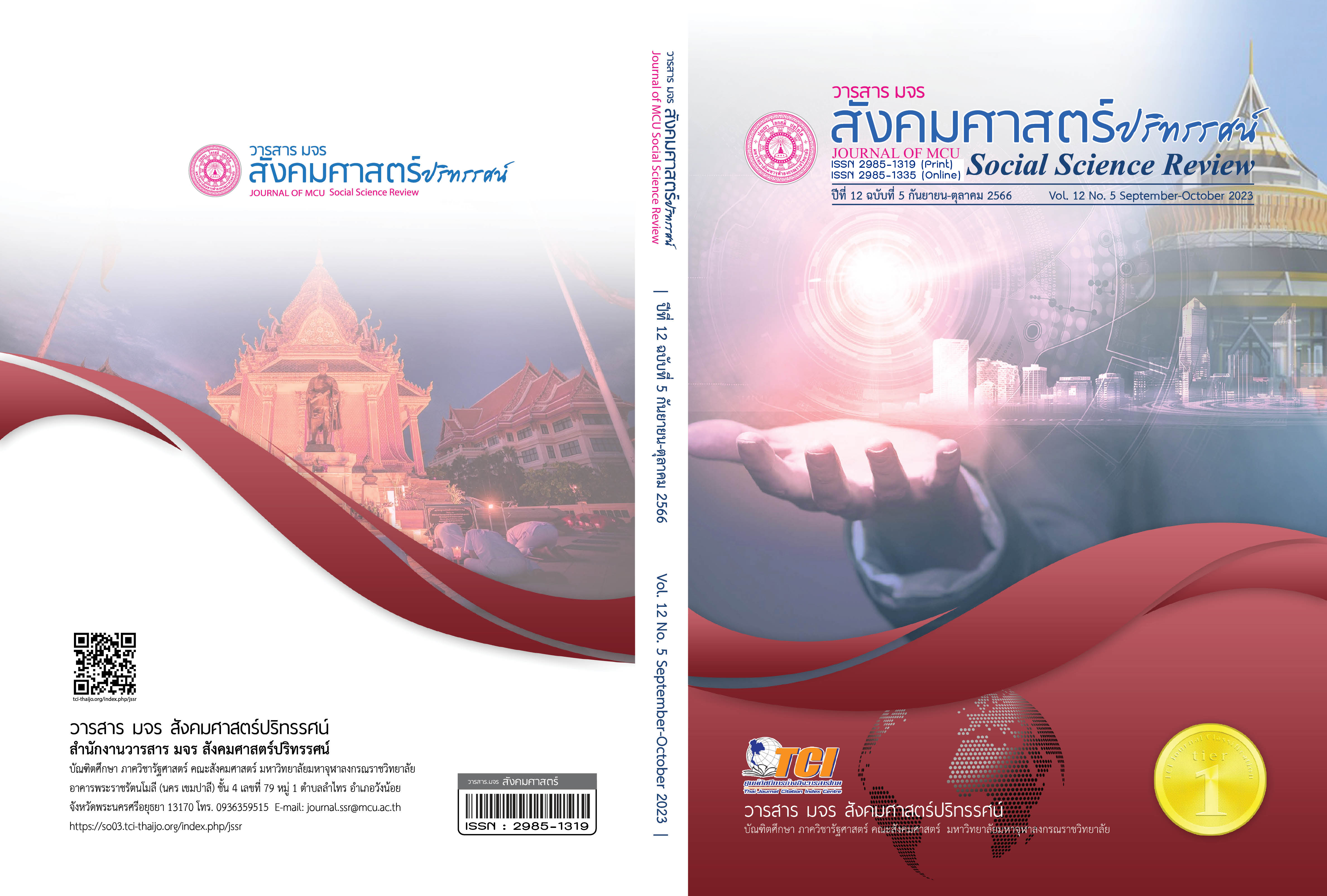แนวทางการบริหารศูนย์การเรียนรู้ตามหลักปรัชญาของเศรษฐกิจพอเพียง ด้านการศึกษาในโรงเรียนมัธยมศึกษา เขตภาคเหนือ
คำสำคัญ:
แนวทางการบริหาร, ศูนย์การเรียนรู้, หลักปรัชญาของเศรษฐกิจพอเพียงบทคัดย่อ
บทความวิจัยนี้มีวัตถุประสงค์เพื่อศึกษาแนวทางการบริหารศูนย์การเรียนรู้ตามหลักปรัชญาของเศรษฐกิจพอเพียงด้านการศึกษาในโรงเรียนมัธยมศึกษา เขตภาคเหนือ บทความวิจัยนี้เป็นการวิจัยเชิงคุณภาพ ด้วยการศึกษาเอกสาร ศึกษาจากโรงเรียนที่มีวิธีการปฏิบัติที่ดี (best Practice) และสัมภาษณ์ผู้ทรงคุณวุฒิ กลุ่มผู้ให้ข้อมูลในการวิจัย ได้แก่ ผู้บริหารสถานศึกษาและบุคลากรในโรงเรียนที่ผ่านการรับรองเป็นศูนย์การเรียนรู้ตามหลักปรัชญาของเศรษฐกิจพอเพียงด้านการศึกษาที่มีผลการปฏิบัติที่ดีจำนวน 3 แห่ง จำนวน 23 คน และผู้ทรงคุณวุฒิ จำนวน 5 คน ได้มาโดยการเลือกแบบเจาะจง เครื่องมือที่ใช้ในการเก็บรวบรวมข้อมูลเป็นแบบสังเคราะห์เอกสาร แบบสัมภาษณ์สำหรับศึกษาโรงเรียนที่มีวิธีปฏิบัติที่ดี (best Practice) และแบบสัมภาษณ์ผู้ทรงคุณวุฒิเกี่ยวกับแนวทางการบริหารศูนย์การเรียนรู้ตามหลักปรัชญาของเศรษฐกิจพอเพียงด้านการศึกษาในโรงเรียนมัธยมศึกษา เขตภาคเหนือ โดยพิจารณาหาค่าความตรงเชิงเนื้อหา ระหว่าง 0.67 – 1.00 วิเคราะห์ข้อมูลด้วยการวิเคราะห์เนื้อหา (Content Analysis)
ผลการวิจัยพบว่า แนวทางการบริหารศูนย์การเรียนรู้ตามหลักปรัชญาของเศรษฐกิจพอเพียงด้านการศึกษาในโรงเรียนมัธยมศึกษา เขตภาคเหนือ มีประเด็นที่สำคัญ 4 ประเด็น ได้แก่ ประเด็นที่ 1 บริบทที่เอื้อต่อการเป็นศูนย์การเรียนรู้ ประเด็นที่ 2 ปัจจัยนำเข้า ประเด็นที่ 3 กระบวนการบริหาร ประเด็นที่ 4 ผลลัพธ์
เอกสารอ้างอิง
คณะกรรมการจัดทำยุทธศาสตร์ชาติ. (2560). การบรรยายเรื่อง ยุทธศาสตร์ชาติระยะ 20 ปี (พ.ศ.2560 – 2579). สืบค้น 1 ธันวาคม 2560, จาก www.ldd.go.th/www/files/817
คณะกรรมการดำเนินงานขับเคลื่อนสถานศึกษาพอเพียง. (2562). แนวทางการประเมินศูนย์การเรียนรู้ตามหลักปรัชญาของเศรษฐกิจพอเพียงด้านการศึกษา ปีการศึกษา 2563. กรุงเทพฯ: กระทรวงศึกษาธิการ.
ชัยอนันต์ สมุทวณิช. (2557). ระบบการบริหารจัดการเพื่อการจัดสรรทรัพยากรสำหรับการศึกษาขั้นพื้นฐาน 12 ปี. กรุงเทพฯ: สำนักงานคณะกรรมการการศึกษาแห่งชาติ.
ปรัชญา พลพุฒินันท์. (2563). จัดการพอเพียง. สืบค้น 30 มีนาคม 2552, จาก http://www.manager.co.th
ฤทัยรัตน์ ปัญญาสิม. (2560). การบริหารงานแบบมีส่วนร่วมที่ส่งผลต่อประสิทธิผลการบริหารสถานศึกษาสังกัดสำนักงานเขตพื้นที่การศึกษามัธยมศึกษา เขต 9 (วิทยานิพนธ์ครุศาสตร์มหาบัณฑิต สาขาการบริหารศึกษา). นครปฐม: มหาวิทยาลัยราชนครปฐม.
ศาลินา บุญเกือ และนันทกาญจน์ ชินประหัษฐ์. (2557). บทสรุปรายงานวิจัยการถอดบทเรียนและวิเคราะห์อัตลักษณ์ศูนย์การเรียนรู้ตามหลักปรัชญาของเศรษฐกิจพอเพียงด้านการศึกษา. กรุงเทพฯ: มูลนิธิยุวสถิรคุณ.
ศูนย์สถานศึกษาพอเพียง. (2563). การขับเคลื่อนเครือข่ายสถานศึกษาพอเพียง. สืบค้น 29 ธันวาคม 2563, จาก http://www.sufficiencyeconomy.org
สำนักงานคณะกรรมการพิเศษเพื่อประสานงานโครงการอันเนื่องมาจากพระราชดำริ. (2562). สรุปภาพรวมข้อมูลโครงการอันเนื่องมาจากพระราชดำริ. สืบค้น 29 ธันวาคม 2563, จาก http://www.rdpb.go.th
เสริมศักดิ์ วิศาลาภรณ์. (2541). การกระจายอำนาจการบริหารและการจัดการศึกษา. กรุงเทพฯ: มหาวิทยาลัยศรีนครินทรวิโรฒ.
Lawson, S. (2003). Examining the Relationship Between Organizational Culture and Knowledge Management. USA: Nova Southeastern University.
White, A.T. (1982). Why Community Participation? A Discussion of the Arguments. Community Participation: Current Issue and Lesson Learned. New York: United Nations Children’s.
ดาวน์โหลด
เผยแพร่แล้ว
รูปแบบการอ้างอิง
ฉบับ
ประเภทบทความ
สัญญาอนุญาต
ลิขสิทธิ์ (c) 2023 วารสาร มจร สังคมศาสตร์ปริทรรศน์

อนุญาตภายใต้เงื่อนไข Creative Commons Attribution-NonCommercial-NoDerivatives 4.0 International License.
เพื่อให้เป็นไปตามกฎหมายลิขสิทธิ์ ผู้นิพนธ์ทุกท่านต้องลงลายมือชื่อในแบบฟอร์มใบมอบลิขสิทธิ์บทความให้แก่วารสารฯ พร้อมกับบทความต้นฉบับที่ได้แก้ไขครั้งสุดท้าย นอกจากนี้ ผู้นิพนธ์ทุกท่านต้องยืนยันว่าบทความต้นฉบับที่ส่งมาตีพิมพ์นั้น ได้ส่งมาตีพิมพ์เฉพาะในวารสาร มจร สังคมศาสตร์ปริทรรศน์ เพียงแห่งเดียวเท่านั้น หากมีการใช้ภาพหรือตารางหรือเนื้อหาอื่นๆ ของผู้นิพนธ์อื่นที่ปรากฏในสิ่งตีพิมพ์อื่นมาแล้ว ผู้นิพนธ์ต้องขออนุญาตเจ้าของลิขสิทธิ์ก่อน พร้อมทั้งแสดงหนังสือที่ได้รับการยินยอมต่อบรรณาธิการ ก่อนที่บทความจะได้รับการตีพิมพ์ หากไม่เป็นไปตามข้อกำหนดเบื้องต้น ทางวารสารจะถอดบทความของท่านออกโดยไม่มีข้อยกเว้นใดๆ ทั้งสิ้น





